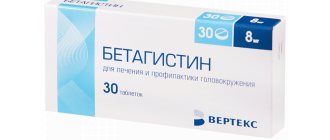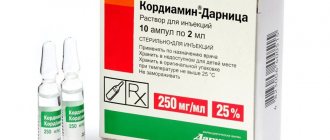Pharmacodynamics and pharmacokinetics
Pharmacodynamics
An artificial analogue of histamine . The effect of betahistine has not been fully studied. There are only a number of hypotheses confirmed by clinical data:
- active substance – partial stimulator of H1-histamine receptors and blocker of H3-histamine receptors of the vestibular centers of the nervous system; improves histamine metabolism and its release due to the above properties;
- betahistine increases blood circulation in the inner ear, relaxing vascular sphincters in this area, and also enhances microcirculation in the brain;
- betahistine stimulates restoration of vestibular function after vestibular neurectomy in animals and humans;
- dose-dependently reduces the generation of impulses in neurons of the vestibular nuclei.
The therapeutic effect of betahistine was demonstrated in patients with Meniere's syndrome and vestibular vertigo , which was expressed by a decrease in the severity and frequency of dizziness .
Pharmacokinetics
When taken orally, the active substance is actively absorbed from the intestine and is almost completely transformed to form a derivative of 2-pyridylacetic acid. The content of betahistine in the blood is low.
Concomitant food intake may slow down the absorption of betahistine. Reaction with blood proteins does not reach the 5% barrier. The maximum concentration of 2-pyridylacetic acid in the blood occurs 1 hour after consumption. The half-life is approximately 3 and a half hours.
The metabolite is actively evacuated in the urine. Excretion of betahistine itself through the kidneys or intestines is negligible.
Betaserk
Betaserc (active ingredient - betahistine) is a drug that improves microcirculation in the inner ear and is used for disorders of the vestibular apparatus, incl. with Meniere's syndrome and vertigo. It is a synthetic analogue of the biogenic amine histamine. The mechanism of action of the drug has only been partially studied. Currently, scientists continue to work on several hypotheses, supported by the results of preclinical and clinical studies. Thus, as one of the mechanisms of pharmacological action of betaserc, its effect on the histaminergic system is considered. The drug stimulates the metabolism and release of histamine due to the blockade of presynaptic H3 receptors and a decrease in the number of H3 receptors. In addition, as was established at the preclinical stage of studying betaserc, the drug is able to activate blood circulation in the cochlea of the inner ear and throughout the brain. This occurs due to a decrease in the tone of the precapillary sphincters in the blood vessels of the inner ear. Preclinical studies have also found that betaserc provides faster recovery of vestibular function in laboratory animals after unilateral vestibular nerve ablation. This property of the drug was later confirmed in clinical trials on humans. Another clinically significant effect of betaserc is the suppression of the generation of action potentials in nerve cells of the lateral and medial nuclei of the vestibular nuclear complex. The effectiveness of the drug was confirmed in patients with vestibular dizziness (vertigo) and Meniere's syndrome, which was reflected in a decrease in the frequency and severity of dizziness. When betaserc is taken orally, it is quickly and completely absorbed from the gastrointestinal tract. Almost immediately after this, it undergoes systemic metabolism to form 2-pyridylacetic acid. When taking betaserc simultaneously with food, the maximum concentration of the active substance in the blood plasma will be lower than on an empty stomach.
However, the total degree of absorption of betahistine in both cases will be approximately the same. In other words, food intake only slows down the absorption of the drug to some extent, without significantly affecting other pharmacokinetic characteristics. Betaserc is quickly excreted from the body through the urine and only to a small extent through the intestines. The rate of elimination of the drug remains unchanged when taken orally from 8 to 48 mg, which indicates the linearity of its pharmacokinetics.
Betaserc is taken with food. The specific dose of the drug is selected individually depending on the severity of the therapeutic response and the patient’s tolerability of treatment. Adults take betaserc 24-48 mg per day. It is possible to divide the tablet into two parts, for which it is placed on a hard, smooth surface in the upward position and pressed from above with the thumb. You should not expect instant relief of symptoms from betaserc: in some cases, visible improvement occurs only after several weeks of regular pharmacotherapy, and a lasting therapeutic effect can develop only after several months. There is clinical evidence that taking betaserc in the initial phase of the disease prevents its further progression or hearing loss at a later stage. As the practice of using the drug shows, dose adjustment is not required in elderly patients. Clinical studies covering the interaction of betaserc with other drugs have not been conducted to date. Based on data from laboratory studies, it can be assumed that in a living organism, the activity of the cytochrome P450 enzyme system will remain at the same level. Being a histamine analogue, betaserc may have an effect on drugs that block histamine H1 receptors. In any case, before starting a course of medication, the patient must inform the doctor about the current or recent use of any medications.
Indications for use of Betaserc
Indications for use of Betaserc:
- Meniere's disease;
- vertebrobasilar insufficiency , atherosclerosis of the cerebral arteries , post-traumatic encephalopathy (as a component of complex therapy);
- syndromes characterized by tinnitus, increasing hearing loss, dizziness , including hydrops of the inner ear , labyrinthine and vestibular disorders, labyrinthitis , vestibular neuritis, benign positional vertigo.
Betaserc tablets, instructions for use (Method and dosage)
The medicine is prescribed to be taken orally with meals. The dosage is selected individually, taking into account the response to therapy.
The daily dose for adults is usually 24-48 mg, divided into 2-3 doses. The 16 mg or 24 mg tablet is easy to split. To do this, place the dosage form on a hard surface with the notch facing up and press firmly on it with your finger.
Sometimes the drug shows its effect only after 2-3 weeks of treatment, and a confident therapeutic effect develops after several months of constant use. No dosage adjustment is required in elderly patients.
Side effects of the drug Betaserc
The following adverse reactions were observed in patients who used Betaserc during placebo-controlled studies with the following frequencies: very common (≥ 1/10), common (≥1/100, ≤1/10), uncommon (≥1/1000, ≤ 1/100), single (≥1/10000, ≤1/1000), very rare (≤1/10000). From the side of the immune system Hypersensitivity reactions, incl. and immediate type (for example, cases of anaphylaxis have been reported). From the gastrointestinal tract Often: nausea and dyspepsia. In some cases, there were complaints of minor dyspeptic disorders (vomiting, pain along the gastrointestinal tract, abdominal pain due to bloating and flatulence). These side effects usually go away when you take the drug with food or after reducing the dose. From the skin and subcutaneous tissue In isolated cases, hypersensitivity reactions of the skin and subcutaneous tissue were observed, in particular angioedema, skin rash, itching and urticaria.
Betaserc's analogs
Level 4 ATX code matches:
Betagis
Stugeron
Betaver
Westinorm
Westicap
Betagistine
Tagista
Vestibo
Cinnarizine
- Betagistine
- Alfaserk
- Microzer
- Asniton
- Betaver
- Betacentrin
- Vertran
- Vestibo
- Westinorm
- Westicap
- Denoise
- Vazoserk
- Tagista (Russian equivalent)
The price of Betaserc analogues is noticeably lower than the price of the described drug.
Betaserc and its analogues (the vast majority) contain betahistine as an active substance, so their indications and contraindications will be identical.
Which is better: Betaserc or Betahistine?
Betahistine and the described drug are analogues with an identical active component. Their indications and contraindications are also the same. The choice should be made based on economic feasibility.
Betaserk or Vestibo – which is better?
Vestibo is a cheaper analogue of Betaserc with almost the same composition. The choice between these drugs should be made for reasons of economic feasibility.
Tagista or Betaserk – which is better?
Tagista is the Russian analogue of Betaserk. The main difference is the price: Tagista rightfully takes the place of the most affordable medicine containing betahistine.
Special instructions for the use of Betaserc
During the use of the drug Betaserc, it is necessary to monitor the condition of patients with pheochromocytoma and asthma. It is also necessary to be careful when treating patients with a history of gastric and duodenal ulcers. Children. Due to insufficient data on the safety and effectiveness of the drug Betaserc, it is not recommended to prescribe the drug to children under the age of 18 years. Use during pregnancy or breastfeeding. Since toxicity studies on the reproductive system in animals do not always allow one to assess the possibility of a toxic effect in humans, during pregnancy the drug should be taken only if there is an undeniable need and under the direct supervision of a physician. The penetration of betahistine into breast milk has not been studied. The benefits of taking the drug should be compared with the benefits of breastfeeding and the potential risk to the child. The ability to influence the reaction speed when driving vehicles and working with other mechanisms. No studies have been conducted.
Betaserk price, where to buy
The price of Betaserc 24 mg No. 20 on average in Russia is about 500 rubles, and the drug with a dosage of 16 mg No. 30 is 600 rubles.
In Ukraine, the price range is wide: a package of medicine with a dosage of 16 mg No. 30 can be bought for about 400 hryvnia.
- Online pharmacies in RussiaRussia
- Online pharmacies in UkraineUkraine
- Online pharmacies in KazakhstanKazakhstan
LuxPharma* special offer
- Betaserc tablet.
24 mg 20 pcs 950 rub. order
ZdravCity
- Betaserc tab. 8 mg No. 30 JSC Veropharm
416 RUR order
- Betaserc tab. 24 mg No. 60 JSC Veropharm
RUB 1,211 order
- Betaserc tab. 16mg No. 30AO Veropharm
612 rub. order
- Betaserc tab. 24mg No. 20AO Veropharm
RUR 554 order
- Betaserc Long tablets 48 mg 56 pcs. JSC Veropharm
1900 rub. order
Pharmacy Dialogue
- Betaserc tablets 24 mg No. 20Abbot/Veropharm
RUR 543 order
- Betaserc tablets 8 mg No. 30Abbot/Veropharm
425 rub. order
- Betaserc tablets 24 mg No. 20Abbot
RUR 541 order
- Betaserc (tab. 16 mg No. 30) Abbot/Veropharm
RUR 617 order
- Betaserc tablets 24 mg No. 60Abbot/Veropharm
RUB 1,269 order
show more
Pharmacy24
- Betaserc 8 mg N30 tablets Abbott Healthcare SAS., France
376 UAH order - Betaserc 16mg N30 tablets Mylan Laboratories SAS, France
423 UAH. order
PaniPharmacy
- Betaserc tablets Betaserc tablets 24 mg No. 20 France, Mylan Lab.
418 UAH. order
- Betaserc tablets Betaserc tablets 16 mg No. 30 France, Mylan Lab.
429 UAH. order
- Betaserc tablets Betaserc tablets 8 mg No. 30 France, Mylan Lab.
432 UAH. order
show more

